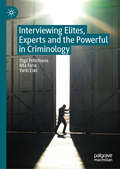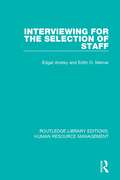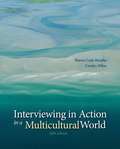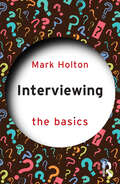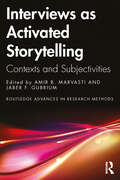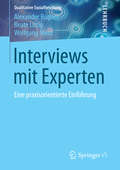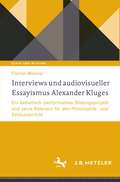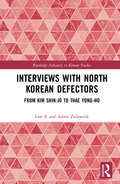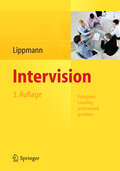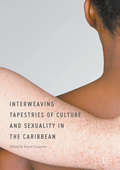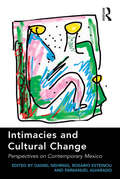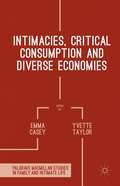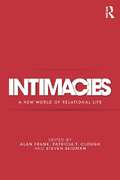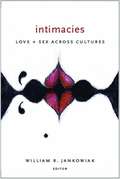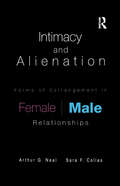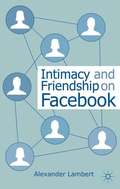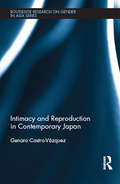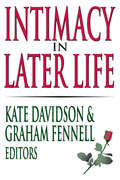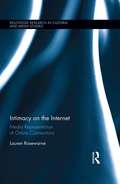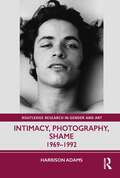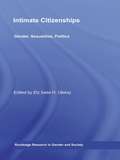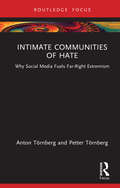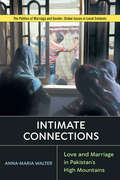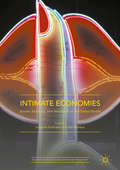- Table View
- List View
Interviewing Elites, Experts and the Powerful in Criminology
by Olga Petintseva Rita Faria Yarin EskiThis book offers practical advice on designing, conducting and analyzing interviews with ‘elite’ and ‘expert’ persons (or ‘socially prominent actors’), with a focus on criminology and criminal justice. It offers dilemmas and examples of ‘good’ and ‘bad’ practices in order to encourage readers to critically asses their own work. It also addresses methodological issues which include: access, power imbalances, getting past ‘corporate answers’, considerations of whether or not it is at times acceptable to ask leading questions and whether to enter a discussion with a respondent at all. This book will be valuable to students and scholars conducting qualitative research.
Interviewing For The Helping Professions: A Comprehensive Relational Approach
by Nicole Nicotera Fred McKenzieA successful professional interview depends on the development of a generally positive human interaction. Without a positive base, the interview can be fraught with difficulties and roadblocks. This is true regardless of the discipline, be it social work, psychology, human services, nursing, criminal justice, medicine, psychiatry, or any other field. Beginning interviewers may have learned solid technique, but often are initially focused more on thinking about what they will say next than on understanding or even listening to the client. As a result, that critical initial interview -- whose success affects the future of most professional encounters -- is often disrupted by a failure to truly listen and understand, which is the foundation for earning clients' trust. This second edition goes beyond most other clinical interviewing books in its emphasis on the emotional foundation of interviewing and its focus on the importance of social justice and attention to the problem of microaggressions that can prohibit building and maintaining therapeutic rapport with clients. Interviewing for the Helping Professions can help both the beginning professional and the veteran interviewer understand the nature and purpose, technique, meaning, emotions, and outcomes of the interviewing process. The book also provides a comprehensive overview of the theory and technique so crucial to meaningful interviewing. More important, it emphasizes the emotional significance of the interaction and grounds the interviewing process in contemporary theories of practice and social justice.
Interviewing for the Selection of Staff (Routledge Library Editions: Human Resource Management)
by Edgar Anstey Edith O. MercerThis book, first published in 1956, is intended for those who interview people to assess their suitability for appointment or promotion to a particular position of employment. The authors discuss different methods of interviewing, how to create appropriate questions for the interview, and how to reach conclusions with the answers given. The authors also include a section which gives advice and guidance to a person who is about to be interviewed.
Interviewing in Action in a Multicultural World, Fifth Edition
by Bianca Cody Murphy Carolyn DillonThis is a text for both graduate and undergraduate students preparing to work in a variety of fields: social work, counseling, psychology, human services, criminal justice, psychiatric nursing, school counselors, and a variety of other helping professions. The book provides students with the clinical wisdom and hands-on practice to fully develop their clinical interviewing skills.
Interviewing: The Basics (The Basics)
by Mark HoltonThis text outlines the relative merits of qualitative interviewing to new and emerging scholars in an accessible way. This is achieved not by providing an exhaustive ‘how-to’ guide but in introducing researchers to the interview technique and using examples of ‘best practice’ from across the social sciences.To ensure the book is both accessible and inclusive, efforts have been made to include case studies from a diverse range of authors, including those from different ethnic and social backgrounds, from outside Western Europe/North America, and from non-academic sources. This book will therefore introduce the reader to the key themes surrounding interview design, implementation, analysis and presentation, using examples and case studies from research across the social sciences. Crucially, the book will not provide exhaustive guidance on how to conduct the techniques. Instead, each chapter includes a range of interview design activities for readers to try which might help them engage with the chapter topics, as well as a 'Summary' box which comprises a short annotated reading list of key texts relating to each of the chapter topics and a checklist of things to consider relating to the chapter topics.
Interviews as Activated Storytelling: Contexts and Subjectivities (Routledge Advances in Research Methods)
by Amir B. Marvasti Jaber F. GubriumChallenging the sanitized view of participants in standardized surveys, Interviews as Activated Storytelling contends that interviewing is a meaning-making process producing useful but context-sensitive knowledge. Through a series of case studies, the book illustrates that participants are not simply there for asking and answering, but inquire and respond in terms of attendant interests and social worlds. Interview interaction and interpretation must take these into account against standardization. In two parts, chapters explore how conditions of the interview process (contexts) and conceptions of interview participants (subjectivities) narratively inform and shape—activate—interviewing and its results. Together with the previously published book Crafting Ethnographic Fieldwork: Sites, Selves, and Social Worlds, insights into the full range of procedural issues in qualitative research are offered.
Interviews mit Experten: Eine praxisorientierte Einführung (Qualitative Sozialforschung)
by Wolfgang Menz Alexander Bogner Beate LittigDie eminente Bedeutung von ExpertInneninterviews für die Forschungspraxis ist unumstritten. Sie gehören in vielen sozialwissenschaftlichen Disziplinen zur alltäglichen Forschungspraxis; sei es als eigenständige Erhebungsmethode, sei es als exploratives oder ergänzendes Instrument im Kontext quantitativer oder qualitativer Forschungsdesigns. Auf der anderen Seite sind ExpertInneninterviews trotz (oder wegen?) ihrer Praxisrelevanz methodisch wenig reflektiert. Dieses Defizit will der vorliegende Band beheben und eine übersichtliche, fundierte und an forschungspraktischen Problemen orientierte Einführung in Theorie und Praxis der ExpertInneninterviews bieten. Neben der Diskussion des methodologischen Hintergrunds und zentraler wissenssoziologischer Basisannahmen (ExpertInnenbegriff, Wissensformen) steht dabei insbesondere die Vorbereitung, Durchführung und Auswertung von ExpertInneninterviews im Mittelpunkt.
Interviews und audiovisueller Essayismus Alexander Kluges: Ein ästhetisch-performatives Bildungsprojekt und seine Relevanz für den Philosophie- und Ethikunterricht (Ethik und Bildung)
by Florian WobserDieser Band entwickelt eine "mediensensible" Fachdidaktik Philosophie/Ethik. In Bezug auf die Lebenswelt der Schüler*innen werden Unterhaltungen und Kunstfilme des Medienphilosophen Alexander Kluge auf dessen Web-TV dctp.tv für eine philosophisch-ethische Bildung wahrnehmbar und denkbar. Kluges audiovisuelle Clips werden als Unterrichtsmedien ernst genommen, ihre Bild- und Tonspur(en) didaktisch gewürdigt. Das Montieren diskursiver und präsentativer Elemente ermöglicht zugleich eine medienphilosophiedidaktische Propädeutik zugunsten des Umgangs mit anderen Web-Inhalten (etwa auf YouTube).
Interviews with North Korean Defectors: From Kim Shin-jo to Thae Yong-ho (Routledge Advances in Korean Studies)
by Lim Il Adam ZulawnikOriginally compiled and written by North Korean defector and author Lim Il, this English-language edition, thoroughly annotated by Dr. Adam Zulawnik, is a fascinating collection of 34 interviews with highly prominent North Korean defectors residing in South Korea, ranging from religious figures, to artists, politicians, North Korea experts, and even divers and subway train operators. The 33 interviews herein are listed chronologically according to the interviewees' date of arrival to South Korea and span almost 70 years. The book also includes six special columns addressing key issues pertaining to North Korean defectors and their lives in South Korea, such as the relationship between North Korean defectors and their South Korean counterparts (South Korean defectors to North Korea; nomenclature (how North Korean defectors have been referred to in South Korean society over time); arrival and settlement provisions from the South Korean government; the nuanced difference between defectors, defector-residents, and the displaced; North Korean defector-residents and their position in South Korean politics; and a short biography of five notable North Korean defector-residents who were not interviewed. The English translation also contains an exclusive 34th interview with Lim Il, the source text author which was carried out towards the end of the project in October 2020. The book is a valuable testament to North Korean defector-residents and unique in that it provides a candid account of each individual’s experience. It will prove to be especially useful to students and scholars seeking to understand the complex dynamics of North Korean society and the status of exiles in South Korea, and a vital resource for students of Korean Studies.
Intervision
by Eric D. LippmannIntervision ist eine spezielle Form des Gruppencoachings, bei der sich Gruppen ohne externe Fachperson treffen, um ihre berufliche Arbeit zu reflektieren - ein Setting, das sich seit Jahren bewährt. Der Autor, Psychologe und erfahrener Organisationsberater, liefert die Grundlagen für den Einstieg in die Praxis der Intervision. Er beschreibt ein einfach nachvollziehbares 6-stufiges Grundmodell und die dazugehörigen Methoden. Schritt-für-Schritt-Anleitungen begleiten die professionelle Einführung und Gestaltung der Intervision in Unternehmen.
Interweaving Tapestries of Culture and Sexuality in the Caribbean
by Karen CarpenterThis book brings together the most recent work of Caribbean psychologists in the English-speaking islands of Jamaica, Barbados and Trinidad on gender and sexuality. The authors analyse the unique challenges posed by contradictions between cultural values and modern sexual expression in the region. They examine a broad range of topics such as conceptions of gender roles in primary school children, sexual behavior and emotional social intelligence in adolescents, and sexual identities and orientations in adults. Chapters cover issues including how women who have sex with women (WSWs) self-identify, the 'Lebenswelt' (life world) of men who have sex with men (MSM) in Jamaica, transsexual care and its psychological impact, the influence of music on sexuality, how intimacy is defined, as well as the relationship between identity formation and the fear of intimacy in Jamaica, and the practice of polyamory in Jamaica and Trinidad. This distinctive collection is the first of its kind, grounded in both qualitative and quantitative research. It presents a sophisticated comparative analyses of the cultures of the Anglophone Caribbean represented by Trinidad, Jamaica and Barbados to offer a broader discussions of intimacy and relationships. With practical implications for therapy, it will be of great interest to scholars and practitioners of gender and sexuality studies, psychology and culture.
Intimacies and Cultural Change: Perspectives on Contemporary Mexico
by Daniel Nehring Rosario EsteinouExploring cultural transformations of intimacy in contemporary Mexico, Intimacies and Cultural Change examines the ways in which globalization and rapid cultural change have transformed the cultural meanings of couple relationships, sexuality, and personal life in Mexican society. Through a range of contemporary case studies, the book sheds light on the ways in which people draw on these cultural meanings in everyday life to account for their experiences and practices of intimacy in different social settings. An interdisciplinary volume, presenting the latest research on the region from experts working in diverse fields within the social sciences, this book will appeal to scholars of sociology, anthropology, geography and social psychology with interests in gender and sexuality, social change and contemporary intimate relationships.
Intimacies, Critical Consumption and Diverse Economies (Palgrave Macmillan Studies in Family and Intimate Life)
by Yvette Taylor Emma CaseyThis volume explores and develops the debates surrounding the emotional and material labour involved in producing and reproducing domestic and intimate spaces. It demonstrates the particular pertinence of everyday consumption, especially for women in late modernity, as they experience specific pressures to manage the work-life balance as part of a broader project of neo-liberal selfhood and subject making. Intimacies, Critical Consumption and Diverse Economies places emphasis on everyday life and the mundane forms of leisure and consumption including fashion, second-hand shopping, storing objects, and appropriating everyday spaces for the display of objects. In doing so, each contribution proposes an alternative to the mainstream accounts of spectacular, public consumption. They explore the various ways in which types of consumption might hold value and capital, and explore the potential risks underpinning 'at home' consumption. Taken together, the chapters examine the geographies and spaces of consumption in international and local-global spheres, asking what might constitute forms of critical consumption in and through diverse economies.
Intimacies: A New World of Relational Life
by Patricia Ticineto Clough Steven Seidman Alan FrankIn the last decade or so, there has been a shift in the popular and academic discussion of our personal lives. Relationships – and not necessarily marriage – have gravitated to the center of our relational lives. Many of us feel entitled to seek intimacy, an emotionally depthful social bonding, rather than simply security or companionship from our relationships. Unlike in a marriage-centred culture, intimacy is today pursued in varied relationships, from familial to friends and to romances. And intimacies are being forged in multiple venues, from face-to-face to virtual, cyber contexts. A new scholarship has addressed this changing terrain of personal life – there is today a vast literature on cohabitation, parenthood without marriage, sex and love outside marriage, queer families, cyber intimacies and friendships. However, much theorizing and research has focussed either on the interior, subjective or sociocultural aspects of intimacies, not their interaction. This volume aims to break new ground: Intimacies explores the psychological terrain of intimacy in depthful ways without abandoning its sociohistorical context and the centrality of power dynamics. Drawing on a rich archive that includes the social sciences, feminism, queer studies, and psychoanalysis, the contributors examine: changing cultures of intimacy fluid and solid attachments and intimacies from hook ups, to sibling bonds, to erotic love a politics of intimacy that may involve state enforced hierarchies, class, misrecognition, social exclusion and violence embodied experiences of intimacy and dynamics of endings and loss a pluralization of intimacies that challenge established ethical hierarchies This volume aims to define the cutting edge of this emerging field of scholarship and politics. It challenges existing paradigms that assume rigid hierarchical approaches to relational life. Intimacies will be of interest for psychoanalysts and for students or scholars in sexualities, gender studies, family studies, feminism studies, queer studies, social class, cultural studies, and philosophy.
Intimacies: Love and Sex Across Cultures
by Ed. Jankowiak William R.No culture is ever completely successful or satisfied with its synthesis of romantic love, companionship, and sexual desire. Whether the setting is a busy metropolis or a quiet farming village, a tension always exists between a community's sexual habits and customs and what it believes to be the proper context for love. Even in Western societies, we prefer sexual passion to romance and companionship, and no study of any culture has shown that individuals regard passion and affection equally.The pursuit of love and sex has generated an infinite number of ambiguities and contradictions, yet every community hopes to find a resolution to this conflict either by joining, dividing, or stressing one act over the other. In this follow-up to Romantic Passion: A Universal Experience?, William R. Jankowiak examines how different cultures rationalize the expression of passionate and comfort love and physical sex. He begins by mapping out the intricacies of the love/sex conundrum and the psychological dilemma of reconciling these competing forces. He then follows with essays on sex, love, and intimacy among Central African foragers and farmers; the love dyad in Lithuania; intimacy among the Lahu of Southwestern China; the interplay of love, sex, and marriage in the High Himalayas; verbalized experiences of love and sexuality in Indonesia; love work as it relates to sex work among prostitutes; intimacies and estrangements in the marital and extramarital relationships of Huli men; infidelity and masculinity in Southwestern Nigeria; and the ritual of sex and the rejuvenation of the love bond among married couples in the United States.
Intimacy and Alienation: Forms of Estrangement in Female/Male Relationships
by Arthur G. Neal Sara F. CollasFirst published in 2000. Routledge is an imprint of Taylor & Francis, an informa company.
Intimacy and Friendship on Facebook
by Alex LambertIntimacy and Friendship on Facebook theorises the impact of Facebook on our social lives through the lens of intimacy. Lambert constructs an original understanding of why people welcome public intimacy on Facebook and how they attempt to control it, asking the reader to re-imagine what it means to be intimate online.
Intimacy and Reproduction in Contemporary Japan (Routledge Research on Gender in Asia Series)
by Genaro Castro-VazquezThis book presents an ethnographic investigation of intimate and reproductive behaviour in current Japanese society, grounded in the viewpoints of a group of Japanese mothers. It adopts a new approach in studying the decreasing fertility rates which are contributing to the ageing population in modern Japan. Based on the accounts of 57 married Japanese women, it employs symbolic interactionism as a framework to examine the various factors affecting decision-making on childbirth. The influence of Assisted Reproductive Technologies (ARTs), abortion and contraception in the daily interactions and experiences of the mothers are analysed to offer a new perspective on the Japanese demographic conundrum. With strong contextual information as the foundation, the book contributes fresh insight into how Japanese women perceive the idea of childbirth in a modernized society, and also assists our understanding of the factors causing Japan’s ageing population. Further, it places the mothers’ experiences within current global debates to highlight the salience of the Japanese case. As the first book to provide an in-depth examination of the social process underpinning the decision to become a mother in Japan, it will appeal to students and scholars of Japanese culture and society, Gender Studies, and Sociology.
Intimacy in Later Life
by Kate M. Davidson Graham FennellTo love and be loved is arguably one of the most powerful and fundamental driving forces sustaining self-esteem and self-identity throughout the life course. Need for reciprocal loving does not change as we grow older, despite failures of health, loss of a partner, late divorce, and alterations of personality due to the aging process. However, most studies of human sexuality have ignored the problems and developing patterns of older adults entering into new partnerships. To fill this gap, Intimacy in Later Life brings together a wide range of distinguished international scholars to address this neglected research area.
Intimacy on the Internet: Media Representations of Online Connections (Routledge Research in Cultural and Media Studies)
by Lauren RosewarneThe focus of this book is on the media representations of the use of the Internet in seeking intimate connections—be it a committed relationship, a hook-up, or a community in which to dabble in fringe sexual practices. Popular culture (film, narrative television, the news media, and advertising) present two very distinct pictures of the use of the Internet as related to intimacy. From news reports about victims of online dating, to the presentation of the desperate and dateless, the perverts and the deviants, a distinct frame for the intimacy/Internet connection is negativity. In some examples however, a changing picture is emerging. The ubiquitousness of Internet use today has meant a slow increase in comparatively more positive representations of successful online romances in the news, resulting in more positive-spin advertising and a more even-handed presence of such liaisons in narrative television and film. Both the positive and the negative media representations are categorised and analysed in this book to explore what they reveal about the intersection of gender, sexuality, technology and the changing mores regarding intimacy.
Intimacy, Photography, Shame: 1969–1992 (Routledge Research in Gender and Art)
by Harrison AdamsThis study argues that intimacy requires an overcoming of shame, and each of these artists, in their own way, uses photography to frame moments that can be shameful to some and intimate others, leaving it to the viewer to navigate this affectively perilous terrain.From the cancellation of Mapplethorpe’s retrospective The Perfect Moment to the obscenity trial in Cincinnati shortly thereafter, to Hujar’s lesser-known but equally “hardcore” imagery, to Goldin’s gritty depictions of domestic violence and substance abuse, to the accusations of child pornography thrown at Mann’s photographs of her own children, the photographers at the heart of this book have probed the limits of acceptability. But there is more to their work than merely controversy; it’s what causes the controversy that matters. The notion of intimacy is at stake in some of our most important human relationships, and thus a great deal hinges on both achieving and preserving intimacy.This book will be of interest to scholars working in art history, photography and gender studies.
Intimate Citizenships: Gender, Sexualities, Politics (Routledge Research in Gender and Society)
by Elzbieta H. OleksyThis volume responds to the need to extend the theory of citizenship, in order to bridge the gap between the public and the private sphere. Through the application of intersectional methodology, the authors document how people’s most private decisions and practices are intertwined with public institutions and state policies. The stories of intimate citizenship included in this volume make the theoretical discussion more palpable. Situated perspectives, as well as application of theoretical concepts to lived experience, extend citizenship’s territory beyond the conventional public sphere and locate it at the intersection of many axes of social, political, and cultural stratification.
Intimate Communities of Hate: Why Social Media Fuels Far-Right Extremism (Routledge Studies in Political Sociology)
by Anton Törnberg Petter TörnbergSocial media has fundamentally transformed political life, driving a surge in far-right extremism. In recent years, radical anti-democratic ideologies have entered into the political mainstream, fueled by energy from extreme online environments. But why do far-right extremist movements seem to thrive so well on social media platforms? What takes place within the fringe online spaces that seem to function as incubators for violent extremists? To answer these questions, this book goes inside the “murder capital of the racist Internet”, examining 20 years of conversations on Stormfront.org. Using a combination of computational text analysis and close reading, we seek a deeper understanding of the emotional and social effects of being part of an extremist community. We lay the foundation of a new way of understanding online extremism, building on the tradition of Émile Durkheim and Randall Collins. We find that online radicalization is not merely an effect of repeated one-sided arguments, as suggested by metaphors such as “echo chambers”. Instead, social media politics can be better understood through Durkheim’s concept of rituals: moments of shared attention and emotion that create emotional energy and a sense of intersubjectivity, weaving from participants a political tribe – united, energized, and poised to act.
Intimate Connections: Love and Marriage in Pakistan’s High Mountains (Politics of Marriage and Gender: Global Issues in Local Contexts)
by Anna-Maria WalterIntimate Connections dissects ideas, feelings, and practices around love, marriage, and respectability in the remote high mountains of Gilgit-Baltistan in northern Pakistan. It offers insightful perspectives from the emotional lives of Shia women and their active engagement with their husbands. These gender relations are shaped by countless factors, including embodied values of modesty and honor, vernacular fairy tales and Bollywood movies, Islamic revivalism and development initiatives. In particular, the advent of media and communication technologies has left a mark on (pre)marital relations in both South Asia and the wider Muslim world. Juxtaposing different understandings of ‘love’ reveals rich and manifold worlds of courtship, elopements, family dynamics, and more or less affectionate matches that are nowadays often initiated through SMS. Deep ethnographic accounts trace the relationships between young couples to show how Muslim women in a globalized world dynamically frame and negotiate circumstances in their lives.
Intimate Economies
by Susanne Hofmann Adi MorenoThis book illustrates how intimate workers in different socio-cultural contexts negotiate the commercial uses of their sexuality, identity, affect, and bodies, thereby often defying inequality, impoverishment, and resource depletion in their regions. The studies shed light on the multi-faceted experiences of subjects involved in intimate economies, oscillating between personal empowerment and agency, as well as the required subjection to the demands of the current market regime, entailing participation in precarious employment, often involving bodily risk, economic exploitation and stigmatization. The contributions demonstrate the interrelatedness of market intimacy, family economies, and transnational care arrangements, and thereby challenge Western notions of the subject and the free market.
